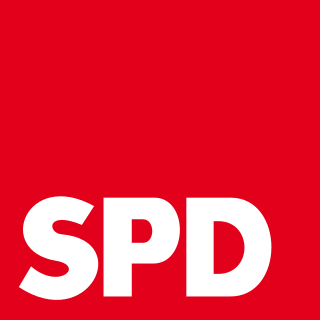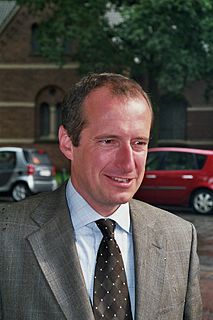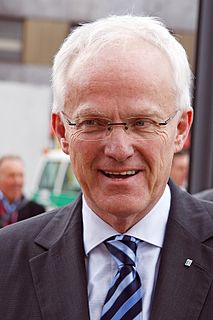This article does not cite any sources .(June 2019) (Learn how and when to remove this template message) |

Cabinet Kraft was the name of the government of the German state of North Rhine-Westphalia from July 2010 until June 2012.

Germany is a federal republic consisting of sixteen states. Since today's Germany was formed from an earlier collection of several states, it has a federal constitution, and the constituent states retain a measure of sovereignty. With an emphasis on geographical conditions, Berlin and Hamburg are frequently called Stadtstaaten (city-states), as is the Free Hanseatic City of Bremen, which in fact includes the cities of Bremen and Bremerhaven. The remaining 13 states are called Flächenländer.

North Rhine-Westphalia is a state of Germany.
Its leader was Hannelore Kraft, elected and sworn in as Minister-President by the Landtag of North Rhine-Westphalia on 14 July 2010. The following day she appointed and swore in her cabinet.

Hannelore Kraft is a German politician. She served as the Minister President of North Rhine-Westphalia from 2010 until 2017. Kraft was the first woman to serve as head of government of this state and was the third woman to become head of a state government in Germany. Between 1 November 2010 and 31 October 2011 she was the President of the Bundesrat, again the first woman to hold the office. She is the former leader of the SPD North Rhine-Westphalia and served on the SPD's federal executive from November 2009 until May 2017, and was one of the four federal deputy chairs.

The Landtag of North Rhine-Westphalia is the state parliament (Landtag) of the German federal state of North Rhine-Westphalia, which convenes in the state capital of Düsseldorf, in the eastern part of the district of Hafen. The parliament is the central legislative body in the political system of North Rhine-Westphalia. In addition to passing of laws, its most important tasks are the election of the Minister-President of the state and the administration of the government. The current parties of government are a coalition of the Christian Democratic Union (CDU) and the Free Democratic Party (FDP), supporting the cabinet of Minister-President Armin Laschet since June 2017.
The government was a coalition government of the center-left Social Democratic Party of Germany and the Green party, who formed a minority government that was short of one seat from the absolute majority in the state parliament, the Landtag. The government failed to get its budget approved by the Parliament in 2012, so the Parliament was dissolved. The subsequent election was won by the two governing parties who went on to form Cabinet Kraft II.

The Social Democratic Party of Germany, is a social-democratic political party in Germany.
Cabinet Kraft II was the name of the government of the German state of North Rhine-Westphalia from June 2012 until June 2017.
The following table shows cabinet members, who held the office of ministers of their respective portfolio except when denoted otherwise. Note that only the Ministers are members of the Cabinet. The Head of the Minister-President's Office, as a Secretary of State, is not an official member of cabinet, but is invited as non-voting attendee.
| Office | Name | Party | Secretary of State |
|---|---|---|---|
| Minister-President | Hannelore Kraft | SPD | Franz-Josef Lersch-Mense Head of the Minister-President's Office |
| Thomas Breustedt Government Spokesman | |||
| Deputy Prime Minister Schools and Education | Sylvia Löhrmann | Greens | - |
| Finance | Norbert Walter-Borjans | SPD | Rüdiger Messal |
| Interior and Local Government | Ralf Jäger | SPD | Hans-Ulrich Krüger |
| Justice | Thomas Kutschaty | SPD | Brigitte Mandt (until 25 January 2012) Karl-Heinz Krems (from 26 May 2012) |
| Economics, Energy, Transport and Building | Harry Voigtsberger | SPD | Horst-Helmut Becker Deputy Minister & Secretary of State for Transport Günther Horzetzky |
| Innovation, Science and Research | Svenja Schulze | SPD | Helmut Dockter |
| Labour, Integration and Social Affairs | Guntram Schneider | SPD | Wilhelm Schäffer Zülfiye Kaykin Secretary of State for Integration |
| Family, Children, Youth, Culture and Sport | Ute Schäfer | SPD | Klaus Schäfer (politician) |
| Climate Change, Environment, Agriculture and Consumer Protection | Johannes Remmel | Greens | Udo Paschedag |
| Health, Emancipation, Care and the Elder | Barbara Steffens | Greens | Marlis Bredehorst |
| Federal Affairs, Europe and Media | Angelica Schwall-Düren | SPD | Marc Jan Eumann |










